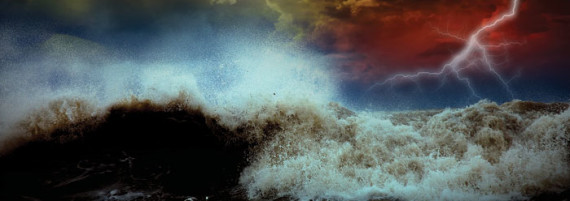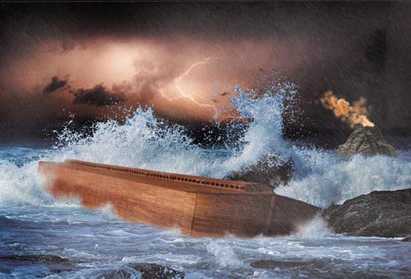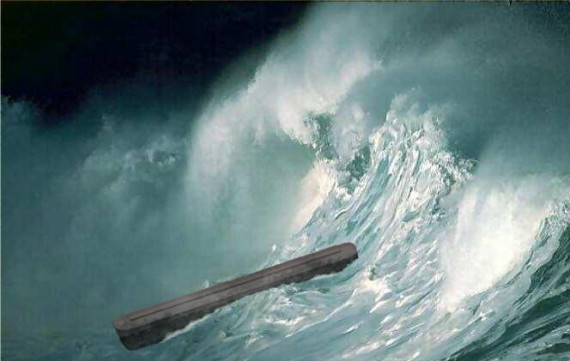The flood narrative in Genesis 6-8 is difficult to understand in light of the self-sacrificing nature of God revealed in Jesus Christ on the cross. How can the God who drowns everybody on earth because of their sin, be the same God who dies for everybody on earth because of their sin? Though there are numerous issues surrounding these chapters, Genesis 8:21 helps us understand what God was doing in the flood. When we understand Genesis 8:21, it shows us that God was acting much more like Jesus than many assume.
Genesis 8:21
After the flood, Noah and his family set out to reestablish themselves on the earth, and when Noah offers a sacrifice to God, God promises to never again destroy every living thing in the same way (Genesis 8:21). God says that even though man’s heart is constantly evil, the flood waters will never again come upon the earth to destroy everything that breathes.
Three things about Genesis 8:21 reveal to us what God was doing in the flood.
1. God Restricts His Own Freedom
First, in previous posts, I have argued that God did not actively “send” the flood, but that it came upon the earth as a natural consequence to mankind’s rebellion. The flood is an example of nature out of control, of sin cannibalizing itself, and of the destroyer seeking to destroy.

One of the primary reasons I have been arguing this is because I believe that God, in the act of creating beings with dignity, value, and free will, God limited Himself from acting in any way that would violate or negate mankind’s dignity, value, and free will.
Though it is popular to say that God can do whatever He wants, God cannot do what is logically impossible (such as make a round square), do anything that violates His own nature (such a sin), or do anything that goes against something He has already decided and determined (such as give humans free will). “God lets the creatures have the freedom to be what God created them to be” (Fretheim, Creation Untamed, 53).
Lots of people have problems with the idea of God limiting Himself for the sake of humanity. They feel that since we are God’s creatures, He can do with us whatever He wants, even if it means squashing us all like bugs under His divine thumb. They often point to the flood as an example of Him doing this very thing.
Note carefully, however, what God says in Genesis 8:21. He says that even though all humanity is completely evil from their youth, He will never again destroy every living thing as He has done in the flood. However a person understands the flood account, Genesis 8:21 clearly reveals God placing a limitation upon Himself.
Genesis 8:21 shows that God places boundaries upon His future choices so that a worldwide flood is never again a possibility. Whatever you think about the flood account, one thing it shows is that our God is a self-limiting God. He restricts His own freedom for the sake of His creation.




 In seeking to understand what is going on in the account of the flood and why the waters that came upon the earth, we must understand the Ancient Near East cosmology. That is, what they thought about how the world worked, and what connections existed between the spiritual realm and the physical realm.
In seeking to understand what is going on in the account of the flood and why the waters that came upon the earth, we must understand the Ancient Near East cosmology. That is, what they thought about how the world worked, and what connections existed between the spiritual realm and the physical realm.


 Of all the violent texts in the Old Testament, the portrayal of the flood in Genesis 6–8 may be the most difficult text to understand.
Of all the violent texts in the Old Testament, the portrayal of the flood in Genesis 6–8 may be the most difficult text to understand. Aside from the grim image of every living thing on earth gasping for breath and choking on water as they sink beneath the waves, the flood story also paints a troubling portrait of a God who seems incompetent because He regrets that He made mankind (Didn’t He know this would happen?), and who then foolishly tries to solve the world’s addiction to evil and violence by committing the greatest atrocity of all: worldwide genocide. One author describes the story with these words:
Aside from the grim image of every living thing on earth gasping for breath and choking on water as they sink beneath the waves, the flood story also paints a troubling portrait of a God who seems incompetent because He regrets that He made mankind (Didn’t He know this would happen?), and who then foolishly tries to solve the world’s addiction to evil and violence by committing the greatest atrocity of all: worldwide genocide. One author describes the story with these words: